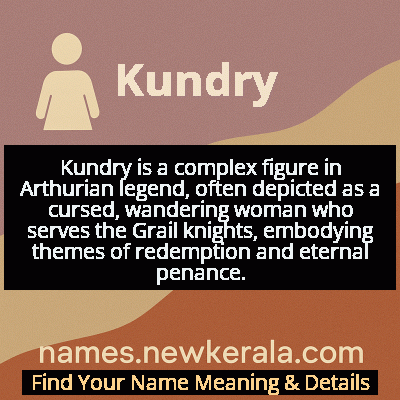Kundry Name Meaning & Details
Origin, Popularity, Numerology Analysis & Name Meaning of Kundry
Discover the origin, meaning, and cultural significance of the name KUNDRY. Delve into its historical roots and explore the lasting impact it has had on communities and traditions.
Name
Kundry
Gender
Female
Origin
Arthurian
Lucky Number
3
Meaning of the Name - Kundry
Kundry is a complex figure in Arthurian legend, often depicted as a cursed, wandering woman who serves the Grail knights, embodying themes of redemption and eternal penance.
Kundry - Complete Numerology Analysis
Your Numerology Number
Based on Pythagorean Numerology System
Ruling Planet
Jupiter
Positive Nature
Optimistic, inspirational, and creative.
Negative Traits
Scattered, exaggerating.
Lucky Colours
Yellow, gold, purple.
Lucky Days
Thursday.
Lucky Stones
Yellow sapphire.
Harmony Numbers
1, 2, 9.
Best Suited Professions
Arts, writing, communication.
What People Like About You
Creativity, optimism.
Famous People Named Kundry
Kundry (Arthurian Character)
Literary Figure
Complex female character in Parzival representing redemption and feminine duality
Kundry (Wagnerian Role)
Opera Character
Central figure in Wagner's Parsifal exploring themes of curse and salvation
Kundry Archetype
Literary Symbol
Representation of the eternal feminine and spiritual transformation in Western literature
Name Variations & International Equivalents
Click on blue names to explore their detailed meanings. Gray names with will be available soon.
Cultural & Historical Significance
In broader cultural context, Kundry symbolizes the integration of shadow aspects and the journey toward wholeness. Her transformations between beautiful and hideous forms represent the societal splitting of female identity into virgin/whore dichotomies. The character's eternal wandering speaks to themes of exile and belonging that resonate across Jewish, Christian, and pagan traditions. Modern interpretations often focus on Kundry as a representation of trauma survival and the long journey toward healing. Her story raises profound questions about forgiveness, both self-forgiveness and divine forgiveness, and whether redemption is possible for those who have committed grave spiritual offenses. The character's complexity ensures she remains relevant as each generation finds new meanings in her ancient story of curse and potential salvation.
Extended Personality Analysis
Individuals associated with the name Kundry typically exhibit remarkable psychological depth and complexity. They often possess an ancient quality of wisdom gained through difficult experiences, making them both world-weary and profoundly insightful. These personalities tend to be highly intuitive, with strong connections to both primal instincts and spiritual awareness. The Kundry archetype suggests someone who has undergone significant personal transformations, perhaps having lived through several 'lifetimes' of experience within one chronological life. They often carry a sense of destiny or purpose that may feel burdensome yet gives their life profound meaning. Emotionally, Kundry-types experience intense passions and may struggle with feelings of guilt, redemption, or unworthiness stemming from past actions or circumstances.
In relationships, Kundry personalities often serve as catalysts for others' growth while navigating their own complex emotional landscapes. They tend to be fiercely independent yet deeply yearn for meaningful connection and understanding. Their strength lies in their resilience and ability to endure profound challenges, though they may struggle with self-acceptance and forgiveness. These individuals often possess a wild, untamed quality that can be both intimidating and magnetic to others. They typically have strong convictions and are unafraid to speak difficult truths, even when those truths make them unpopular. The shadow aspect of the Kundry personality might include tendencies toward self-sabotage, difficulty trusting others, or patterns of destructive behavior rooted in unresolved past trauma. However, their greatest potential lies in their capacity for profound transformation and their ability to guide others through dark passages toward light and understanding.
Modern Usage & Popularity
In contemporary naming practices, Kundry remains an exceptionally rare choice, typically selected by parents with strong interests in literature, mythology, or opera. The name's usage is largely confined to intellectual and artistic circles where its rich cultural associations are appreciated. According to available naming data, Kundry has never ranked within the top 100,000 names in English-speaking countries, maintaining its status as a distinctive literary choice rather than a mainstream option. Modern usage occasionally appears in fantasy and historical fiction communities, where authors and fans appreciate the name's depth and mythological resonance. The name saw minor revivals during Wagnerian opera peaks in the late 19th and mid-20th centuries, and more recently with feminist reinterpretations of Arthurian legends. Contemporary bearers often report that the name sparks conversations about its origins and meaning, creating opportunities to share cultural and literary knowledge. While its complexity and association with tragic themes may deter some parents, others value precisely these qualities as representing depth, resilience, and transformative potential. The name's rarity ensures it remains distinctive while carrying substantial cultural weight and historical significance.
Symbolic & Spiritual Meanings
Kundry embodies profound symbolic meanings that transcend her specific literary origins to represent universal human experiences. She symbolizes the eternal wanderer - the soul condemned to roam until finding redemption or completing a sacred task. This archetype resonates with themes of exile, belonging, and the search for home that appear across world mythologies. Her transformation between beautiful and hideous forms represents the societal fragmentation of feminine identity and the integration of shadow aspects necessary for wholeness. Kundry's laughter at Christ's suffering symbolizes humanity's capacity for both profound spiritual failure and the possibility of ultimate redemption, making her a powerful metaphor for grace and forgiveness. The character also represents the concept of eternal recurrence - the idea that certain patterns and lessons repeat until fully understood and integrated. Symbolically, she embodies the repressed feminine wisdom that Western culture has often marginalized or demonized, representing the wild, intuitive knowledge that exists outside structured religious and social systems. Her story speaks to the tension between free will and destiny, as she appears both cursed and capable of choice within her circumstances. Ultimately, Kundry symbolizes the possibility of transformation no matter how long one has been trapped in destructive patterns, offering hope that redemption remains possible even after profound spiritual failures or centuries of wandering.

